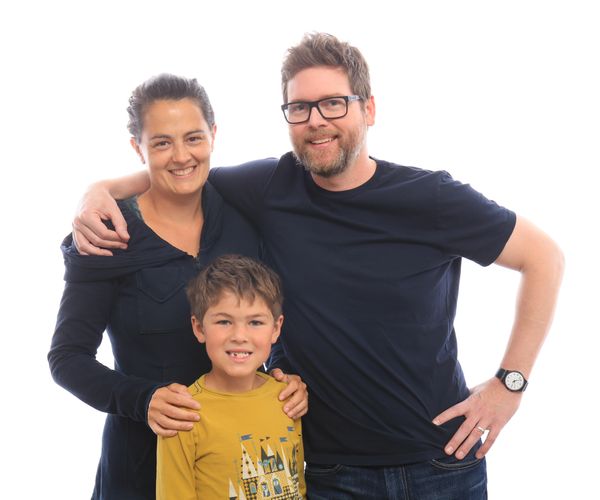A gift to help change the world
For Biz and Livia Stone, supporting causes they believe in is as natural as life. The inspiration to give comes from various places: animals injured or orphaned from the California wildfires, teachers looking for books in underfunded schools, children in need of sweaters, the planet in the throes of climate change.
In the case of Boston University’s Center for Antiracist Research, it came from the words of founding director Ibram X. Kendi himself.
“How To Be an Antiracist, by Dr. Kendi, changed my life,” says Livia, an animal rights and education activist. “I’ve been taking a lot of classes at our community college about racism in American history and trying to wrap my mind around all the stuff they didn’t teach us when we were kids.” Kendi’s ideas, she says, both crystallized the problem and what we, as citizens, can do about it. “It reinvigorated me,” she says. “OK. We have the tools. We can lay a foundation of truth. We can do something really meaningful and make a difference in the world.”
Her husband, Biz, jumps in to agree. “The way he talks about policy changes being crucial and putting science behind the actions—I was like, yes!” says Biz, the cofounder of Twitter and other technology companies, including the search engine Jelly and the open digital publishing platform Medium. “It’s super-exciting for us. We are science people and know that evidence drives change.”
Spurred to give
In the worlds of philanthropy and public service, Livia and Biz are lauded for walking the talk. Driven by Dr. Kendi’s vision, they fairly ran.
In December, they set up a $500 monthly recurring donation to the Center, followed a few months later by a $1 million gift—half to support the Center’s endowment and half current use to support its Narrative Office, which this spring will launch The Emancipator, a multimedia platform founded in partnership with The Boston Globe opinion team that will reimagine William Lloyd Garrison’s legendary 19th-century abolitionist newspaper, The Liberator.
“The combination of The Emancipator’s historic echoes and new voices speaking about new ways to address racism, the launching of a platform for groundbreaking ideas—all of that intrigued us,” says Livia.
Monica Wang, associate director of Narrative at the Center and associate professor at the BU School of Public Health, emphasizes the significance of the platform’s public role. “The goal for The Emancipator is to catalyze interdisciplinary dialogue and understanding of what is driving racial inequities, as well as communicate and cultivate innovative solutions to address them,” says Dr. Wang. As such, it will blend academic research, reportage, and evidence-based opinion in an effort to reframe the national conversation on racial justice. “We are writing today to create a more equitable society tomorrow,” she says. “The Stones’ gift allows us to embark on that journey.”
The twists and turns on that journey require a revolutionary approach to studying racism, Kendi believes. The Center brings together people from a variety of disciplines and offices—researchers, practitioners, data analysts, advocates, and policy experts—from across BU and beyond to develop novel ways to solve seemingly intractable problems of racial inequity and injustice. The aim, Dr. Kendi noted in his proposal to the Stones, is to “ensure that our research informs policy, changes narratives, and galvanizes advocacy—in short, fosters racial change.”
“One of the oldest narratives in American history is the narrative that people are the problem, as opposed to policies, as opposed to conditions those people are forced to live in,” says Dr. Kendi, the Andrew W. Mellon Professor in the Humanities at BU. “We need researchers and storytellers and evidence to create a new narrative showing that the problems of the society we need to fix are policies, not people. This generous gift from Biz and Livia will go a long way toward helping the Center do that.”
A personal connection
The Stones divided their gift between the endowment and current use funds to help ensure continuing support to the Center and also address immediate needs, such as the launch of The Emancipator. The Center-Globe partnership, they say, resonated personally with them.
Both Livia and Biz began their careers in publishing in Boston, at Little, Brown and Company—Biz upstairs in the mansion on Mt. Vernon St. designing book jackets and Livia downstairs in children’s editorial. Back then, they lived in a cramped 400-square-foot apartment behind Bruegger’s Bagels in Coolidge Corner.
Biz’s leap into book design, similar to his conception of Twitter, was serendipitous. Hired part-time at Little, Brown to move boxes, he snuck into the art director’s office when everyone was at lunch. Using his art background and innate technological prowess, he designed a jacket for the book . Wowed, the art director took it to New York to be reviewed by the top editors and the sales team. He didn’t learn that it was Biz’s design till he returned with the approval to print.
The couple’s approach to philanthropy carries that same think-outside-the-box enthusiasm. They are drawn to organizations that value creativity and touch their hearts not just with their causes but with their relationship to their supporters, regardless of gift size. Compassion—for people, for animals, for the environment, for equity for all—drives their giving. Indeed, for Biz, even Twitter represents not the importance of technology but “the triumph of humanity.”
“We’ve corresponded with Dr. Kendi as well as BU’s gift officers and can’t wait to visit the Center and meet them,” says Livia. “Helping others helps us, too.”
